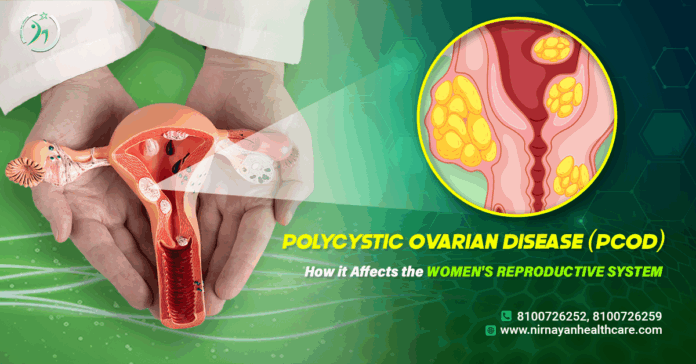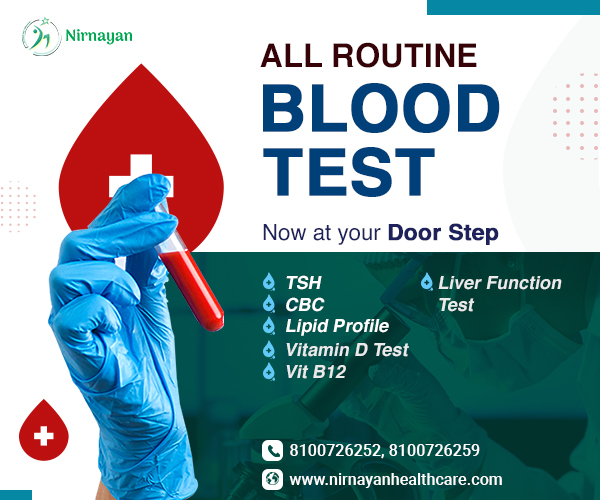What to do if anything happens due to women’s infertility getting imbalanced with hormonal changes, and the ovaries are affected with multiple disorders? PCOD is known as Polycystic Ovarian Disease, which directly affects women’s reproductive health and causes trouble in women’s fertility. To get an effective treatment, you need to be aware of the symptoms & causes of PCOD. With timely diagnosis and precautions, you can control it.
It’s an increasing matter of public health concern, and PCOD sometimes gets confused with PCOS – known as Polycystic Ovary Syndrome, but both are relevant to the women’s reproductive system.
What is PCOD?
Polycystic Ovarian Disease (PCOD) is a commonly known disease related to the women’s reproductive system. In this condition, the ovaries produce immature or partially mature eggs, which later develop into cysts within the ovaries and can cause various complications. For this secretion, massive changes can happen in the ovaries, like size increases, male hormone production (androgen), and an inability to fertilise, which causes most women’s infertility.
If you have any signs and symptoms of PCOD or POS syndrome, consult your medical professionals and act fast for the right treatment.
Causes of PCOD:
There is no exact cause of PCOD, but several factors are related to PCOD, including,
- Increased androgen levels (Hormonal fluctuations): In women, the ovaries produce higher-than-normal male hormone (androgens), which creates difficulties during ovulation. Also, poor diet and obesity are linked with increased levels of androgen hormone production, which higher the risks of PCOD in women.
- High insulin level: Many women with PCOD have insulin resistance, a condition in which the body’s cells do not respond efficiently to insulin. The body produces extra insulin to compensate, stimulating the ovaries to release more male hormones. This hormonal shift often contributes to weight gain in PCOD and intensifies the symptoms of PCOD.
- How family history increases PCOD risk: Genetic factors also may play a role in PCOD; women with a family history of PCOD have higher risks of getting this disease.
- Unhealthy lifestyle and PCOD: PCOD and POS syndrome may happen because of unhealthy lifestyle habits, improper diet practices, nutritional deficiencies, and lack of physical activity.
- Genetic causes of PCOD: PCOD and PCOS are prevalent endocrine disorders in women, with genetic factors being major contributors. These genetic variations tend to boost the production of androgens and other hormones like luteinizing hormone and anti-Mullerian hormone, which are essential for regulating ovulation.
Common PCOD Symptoms you need to be aware of:
In India, 1 out of 5 women is suffering from PCOD – in some cases, it can be genetically or due to hormonal dysfunction. The common PCOD symptoms include,
- Irregular menstrual cycle
- Unexpected weight gain
- Difficulties in conceiving (Infertility)
- Excessive hair growth in different body parts (hirsutism)
- Hair thinning or hair loss
- Fatigue and hormonal imbalance
- Fattiness in the abdomen
- Acne and oily skin
- Pelvic pain or discomfort
- Mood swings in PCOD
- Dark patches on skin (Acanthosis nigricans)
- Excess facial hair (hirsutism)
Early signs of PCOD in teenage girls:
Although the terms PCOD and PCOS (Polycystic Ovary Syndrome) are often used as if they mean the same thing, PCOD is typically viewed as a milder condition with lower long-term metabolic risks. Still, both disorders present overlapping symptoms and demand consistent lifestyle adjustments along with appropriate medical care.
Difference between PCOS & PCOD:
There is a major confusion between PCOD (Polycystic Ovarian Disease) and PCOS (Polycystic Ovary Syndrome), as both are related to women’s reproductive system dysfunction.
PCOD (Polycystic Ovarian Disease) is an ovarian condition in which a large number of immature or partially mature eggs are released, potentially leading to the development of numerous cysts.
PCOS (Polycystic Ovary Syndrome) is more serious and severe than PCOD, as it can happen due to a major metabolic or hormonal imbalance. POS syndrome affects the ovaries along with other body organs. Its consequences are more effective than PCOD.
PCOD & Women’s Health:
A large number of women are affected by PCOD globally, with several complications – the primary complication is menstrual irregularity. It can cause disorders or irregularities in the menstrual cycle due to less ovulation. PCOD affects ovulation, which creates difficulty in conceiving.
Women with PCOD have a higher risk of developing insulin resistance, which also contributes to type 2 diabetes and unnecessary weight gain. This metabolic factor also heightens their chances of experiencing cardiovascular problems.
Complications of having PCOD:
Women who are already affected by PCOD also have a higher level of androgen (male hormone), which causes other complications, such as,
- How does PCOD impact fertility and pregnancy?
PCOD causes disrupted ovulation, which reduces the chances of conception since the regular release of eggs is crucial for fertilisation. Additionally, hormonal disturbances—particularly an increase in male hormones—can interfere with ovarian function and disrupt the normal menstrual cycle, and cause POS syndrome.
- Miscarriage & Difficulty in conceiving:
PCOD causes a huge number of miscarriages, and factors related to miscarriages due to PCOD include insulin resistance, hormonal imbalance, and other metabolic issues. People with PCOD also face difficulty in conceiving due to abnormal or irregular periods, which makes it difficult for proper prediction of ovulation and the natural process of conceiving.
- Abnormal Uterine Bleeding:
In PCOD, irregular ovulation often triggers abnormal uterine bleeding. This may appear as unpredictable menstrual cycles or unusual bleeding patterns, which can further complicate fertility in those affected. The disruption in ovulation can also impact the endometrial lining of the uterus. When the lining is not shed regularly during menstruation, it may gradually thicken, increasing the likelihood of abnormal bleeding and related complications.
- Depression & mood swing: As it is related to hormonal imbalance, in women, it may cause depression and frequent mood swings. PCOD Causes
Irregular menstrual cycles that develop mood swings, which is known as premenstrual syndrome (PMS).
- Premature Birth:
Women with PCOD have a higher likelihood of experiencing pregnancy-related complications. That mostly causes premature birth issues. Factors such as insulin resistance, hormonal imbalances, and underlying inflammation can significantly contribute to the triggering of early delivery.
PCOD Treatment & Measures to Prevent:
As there is no such cure for PCOD, through some preventive measures, you can manage or control this disease.
- Lifestyle modifications:
- Healthy protein diet
- Physical activity
- Manage stress
- Quit smoking & alcohol
- proper sleep
All can help maintain hormonal balance, which helps in insulin regulation and reduces PCOD causes.
- Fertility treatment: In recent medical advancements, through IVF therapy or ovulation therapies, infertility issues can be managed.
- Medications: Hormonal imbalances can be managed with the help of birth control pills, anti-androgen medications, and insulin-sensitising drugs. Consult your doctor immediately if you have any endocrine system disorder, as it may affect you drastically later.
How to plan a pregnancy with PCOD treatment?
Getting pregnant with PCOD and POS syndrome is quite concerning, and it involves some steps of diagnosis and doctor consultations.
- Control your body weight. As weight gain in PCOD is common, but as you are getting pregnant, you should check your body weight and have to maintain a healthy body weight. Follow your doctor’s advice for proper BMI (Body Mass Index).
- Follow your menstrual cycle calendar to get pregnant with PCOD and PCOS issues.
- Restrict your diet to healthy food items, good fat, protein, and fruits. Follow your diet chart.
- Regular doctor checkups are necessary, and strictly follow your medication courses as prescribed.
Can PCOD be cured permanently without medicine?
With proper medications and diagnosis, you can control PCOD risks and its symptoms. Millions of females worldwide are having PCOD issues with serious complications, along with Infertility cases.
Can stress and poor sleep cause PCOD?
Stress and lack of sleep can affect hormone production. During sleep or rest, your body repairs and processes various body and psychological functions, including hormone production.
Stress and poor sleep lead to hormonal imbalance, which affects PCOD in women.
When to see a doctor:
If you see symptoms such as missed or irregular periods, abdominal pain, infertility, difficulties in conceiving, unnecessary weight gain, and excessive body hair growth, contact your medical professionals as soon as possible, and do the required pathology tests at Nirnayan, the best laboratory chain across Kolkata.
Conclusion:
PCOD is a common disease among women in today’s world, and infertility in women increases rapidly with this. Effective treatment management can help to overcome this disease, as it is not cured, but you can manage its complications by managing it with precautions. Ultimately, the journey with PCOD is not just about addressing symptoms; it is about nurturing balance, fostering resilience, and empowering oneself to live a healthier, more harmonious life.




